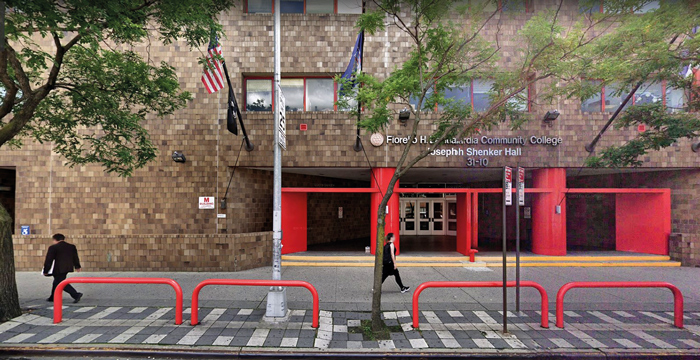Photo Courtesy of Google
Comptroller Stringer’s plan calls for tuition-free CUNY community colleges, such as LaGuardia Community College in Long Island City.
By Forum Staff
City Comptroller Scott Stringer on Wednesday unveiled a comprehensive overhaul of workforce development in New York City, including making CUNY community colleges free for all to build a more competitive and inclusive post-pandemic economy and to better align training with the jobs of tomorrow.
With COVID-19 displacing hundreds of thousands of workers and rapidly accelerating long-standing trends in e-commerce, telework, digitization, and automation, Stringer’s plan calls for the City and State to dramatically expand the scale, quality, accessibility, and affordability of education and job training programs. Stringer also outlined a series of proposals to upskill millions of New Yorkers, diversify high-wage industries, and generate career opportunities during the current economic crisis and beyond to spur recovery across the five boroughs.
According to the comptroller, the State should make CUNY community colleges tuition-free and the City should guarantee universal access to CUNY ASAP for all community college students. CUNY ASAP, which provides financial assistance for books and transportation as well as structured academic supports like tutoring and personalized academic advisory, should be expanded to all full-time community college students, Stringer added. His plan notes that CUNY should hire 50 “college navigators” to help advise adult learners who have been away from higher education for several years. These navigators will provide specialized supports, helping adult learners overcome the logistical, financial, and academic barriers to earn their desired credential or degree, Stringer said. And CUNY must invest in experienced, full-time faculty. For years, CUNY has increasingly relied on part-time staffers to fill a broad range of positions—from classroom professors and librarians, to lab technicians and administrative support staff. Indeed, part-time adjuncts now comprise more than 50 percent of CUNY’s teaching staff. The combination of low salary and the time spent traveling from one campus to another means that part-time faculty are frequently less able than full-time faculty to invest the time necessary to fully develop the academic and workplace potential of students, the comptroller reasoned.
“CUNY is essential to any workforce development strategy in New York City—which means it is vital to our City’s economic recovery. The pandemic exposed inequities in our economy and worsened the longstanding gaps in our social safety net. While some sectors of our workforce have the tools, resources and career flexibility to work remotely, many New York City jobs and careers have been derailed and debilitated by the economic shutdown. As we work to recover and rebuild, we must address these gaps and ensure that New York City’s workforce is strong and ready to take on the opportunities and challenges of the post-COVID, 21st century global economy,” Stringer said. “My plan overhauls and modernizes our approach to job training, job placement, and education to reflect the evolution of work and aims to break down systemic barriers that have historically excluded women, people of color, immigrants and young people from higher-wage industries. As we emerge from this economic crisis, we need to work with CUNY and other engines of economic mobility to build a pipeline of opportunity for the next generation and live up to a promise that anyone can make it in New York City.”

